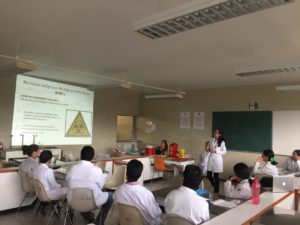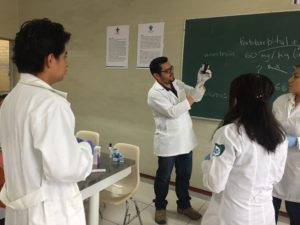The Institute for Brain Research (Iice) is an academic entity of the Universidad Veracruzana (UV) dedicated to conduct basic scientific research with a multidisciplinary approach, based on the study of laboratory animals.
Our purpose is to generate knowledge about the organization and functioning of the brain, spinal cord and peripheral nervous system, as well as their participation in the control of the physiological mechanisms of learning, memory, body movement control, hormonal control and reproduction.
We also carry out basic research on neuropathologies, neurodegenerative diseases and neurooncology, for the production of knowledge that supports the design of new therapies.
The Iice has the following functions:
- Offer postgraduate studies oriented to the research of the brain, its structure, functioning and diseases.
- Create a space for academic activities dedicated to the study of the brain of animals, making the most of the resources obtained, optimizing their use, forming collaboration groups and promoting the link with teaching.
- Generate lines of research that respond to the need to create new knowledge of global utility, impacting on the local and regional needs of the understanding of the human brain to have new and modern tools in the design of therapies and treatments that alleviate brain diseases.
- Organize intensive national and international short-term courses to allow additional training outside the walls for undergraduate and postgraduate students.
- Design strategies that allow the impact of research and teaching on the different related degrees of UV, in order to offer neuroscience as a continuity in the professional training of students.
- Maintain the dissemination of research and teaching activities given the importance and need of the population to receive scientific information about the brain.
- Establish support programs for the general population, as well as orientation of actions that benefit brain development.
- To promote collaboration agreements for obtaining external resources through national and international bodies for the development of research and to establish working links with the productive sector, so that action mechanisms can be established that allow the use of the knowledge generated in the implementation of technologies for the application of knowledge in the area of neurosciences.
The curriculum map is organized under the premise that the Doctorate in Brain Research is full-time dedication and specifically directed to the field of scientific research. Eight periods are proposed, of which the first four will be focused on teaching in front of the group (basic area), but with important activities of scientific practice, and the last four will be directed, mostly, to scientific work. For this, the student develops his research project (from the first semester) in the laboratory of his principal or even during stays through scholarships or agreements. In detail, the academic activities of the program focus on the following points:
Academic activities: The student must successfully complete academic activities, which will expand their training (see curriculum map).
Research work: It consists of the elaboration, proposal and development of an original research project. The student will be followed up with a tutorial committee that will advise on the aspects of elaboration and discussion of the research approaches and results.
Optional educational experience : a course chosen by the student and his principal, different from those offered on the curriculum map. It has the purpose of reinforcing specific knowledge related to the research project or weaknesses that in this period the student presents. Such experience could be exempted by proof of having taught a bachelor’s degree. The dates of the proof of said activities must correspond to the semester taken. When the student makes a stay through the Conacyt mixed scholarship program abroad, the courses corresponding to the semester in which the stay was made are exempted.The list of optional experiences offered by the Doctorate are the following:
- Cellular and molecular biology
- Chronobiology
- Immunohistochemistry
- Review and scientific writing
- Introduction to applied multivariate statistics
- Science communication workshop
- Critical analysis of scientific texts
Research project: refers to the work carried out by the student in a research laboratory during each period. A monographic part will refer to the advances in the understanding of the proposed line of research and the related readings (theoretical, heuristic and axiological knowledge), while the research part as such will refer to the advances in research project development proposed (laboratory work). Both are developed in collaboration with its principal and it is he who will evaluate the student’s performance during the semester. The student must, on the one hand, hand over the progress of the manuscript at least one week before the exam date and on the other hand, prepare an oral presentation (approximately 30 minutes), in which he presents his knowledge and the advances obtained during that period. . The evaluation of the aspects mentioned above provides the qualification of the research project course (also called tutorial).
Justification
The brain is the most complex structure that man knows so far and one of those that most awakens his desire for knowledge. This has been recorded in an Egyptian papyrus dating from about 3000 BC, where the word brain appears for the first time. One of the most fascinating characteristics of that mass of approximately one and a half kilograms of weight that is housed inside our head is that it is the governing organ of the body. In a way still incomprehensible in many aspects it controls all activities, voluntary and involuntary, modulates our growth, maturation, socialization, language, cognitive abilities and, in general, allows us to be who we are.
To date, there is still much to discover about the structure and functioning of the brain and the nervous system in general, none of its pathologies is curable; however, the knowledge generated and the high degree of specialization of research around this organ, makes the demand for specialized professionals is growing.
As the population grows, and medical achievements increase life expectancy, confrontation with severe neurological disorders has become much more marked. Solving this challenge requires several actions and one of them is to train specialists in the field, which is the objective of this educational program of Doctorate in Brain Research (DIC).
The DIC is a research-oriented program, taught by researchers-teachers from the Universidad Veracruzana. Most of the courses are taught on Xalapa, Veracruz, however, the doctoral program has expanded, and offers its students the option of doing their research thesis at the different research institutes and campus of the Universidad Veracruzana. The variety of laboratories that participate in our doctoral program offers students different options to carry out their research experience.
Neuroscience research at the Universidad Veracruzana covers several areas, including molecular biology, cell biology, development, behavior and cognition, neuroengineering, and clinical research.
Mission: conceptually, the DIC will be focused on the training of high-level specialized human resources, with the capacity to carry out research activities on the functions of the brain, spinal cord and peripheral nerves, from the molecular level to the behavioural level. The goal is that the graduates of this educational doctoral program have the theoretical and practical tools to elucidate the physiological and physiopathological processes of the nervous system. This program teaches the basic concepts of the functioning of the nervous system and the use of techniques and probes for the manipulation of it, with the aim that graduates are able to make discoveries that allow proposing new therapeutic approaches that help improve the quality of life of patients with brain and spinal cord diseases.
Vision: our vision is directed towards the training of young, nationally and internationally competitive researchers in the area of neurosciences. To achieve this goal, the curriculum map requires students to complete their solid academic education in no more than four years.
The proposed curricular map has as its objective that students specialize in neurobiology and pathology of the nervous system. This curricular map arises from the intense discussion carried out by all the members that make up the academic nucleus of the present proposal. During this process, the researchers made several proposals that were analyzed in detail until a consensus was reached on each of the subjects shown below. This with the purpose of creating a curricular map that promotes teaching and that integrates the student to local, regional and national needs in terms of knowledge of neurosciences, but also to the perspective of making the doctoral program competitive at an international level in the short term. To achieve these objectives we have a solid core of professors. All the members of the academic nucleus have the degree of doctor, more than 90% are members of the National System of Researchers (SNI) and have postdoctoral experience abroad. All of them are professors with a desirable Prodep profile. The international relations and links of these professors have meant that since its creation, this doctorate has maintained links with various foreign institutions, mainly in the United States, Canada, Chile and Spain, who made relevant contributions to the integration of the curricular map that is currently in force and that, depending on scientific advances, will have to evolve.
Objectives
- To train qualified doctors to carry out autonomous scientific research of quality and excellence, capable of teaching at undergraduate and postgraduate levels in the field of neurosciences.
- Present the results of LGAC research projects in national and international discussion forums.
- Know the arbitrated and indexed scientific publication media and publish the results obtained.
Goals:
- Achieve 70% terminal efficiency from first generation.
- At least 50% of the graduates enter the SNI.
- Make presentations in national or international forums.
- Publish research results in journals with international impact and registered in the JCR.




